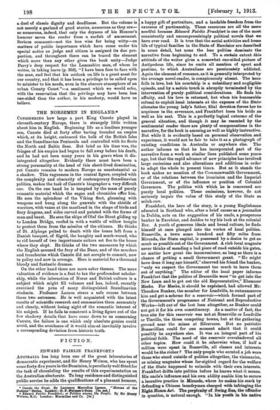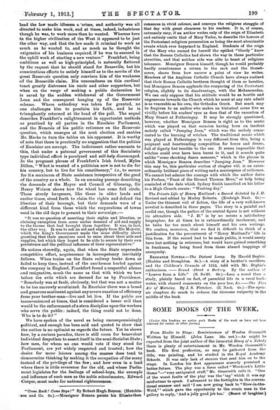FICTION.
EDWARD FArRLIE FRANKFORT.t AUSTRALIA. has long been one of the great laboratories of democratic experiment, and Sir Henry Wrixon, who has spent some forty-five years in the Dominion, is peculiarly well fitted for the task of chronicling the results of this experimentation on the Australian electorate. To long residence and distinguished public service he adds the qualifications of a pleasant humour, • Canute the Great. By Laurence Manaus Larson. "Heroes of the Nations " Series. 'London O. P. Rntnem's Sons. Ds. net.] t Edward Fairlie Frankfort; or Politics among the People. By Sir Hwy
• _ Wrixon, N.C. London: Macmillan and Co. res.]
a happy gift of portraiture, and a laudable freedom from the excesses of partisanship. These resources are all the more needful because Edward Fairlie Frankfort is one of the most consistently and uncompromisingly political novels that we have ever read. It is true that the social activities and home, life of typical families in the State of Excelsior are described in some detail, but none the less polities dominate the narrative from beginning to end. To a certain extent .thin attitude of the writer gives a somewhat one-sided picture of Antipodean life, since he omits all mention of sport and pastime, to which Australians are passionately addicted. Again the element of romance, as it is generally interpreted-by- the average novel-reader, is conspicuously absent. The hero- falls in love, but his courtship is a subsidiary and negligible- episode, and by a satiric touch is abruptly terminated by the- intervention of purely . political considerations. He finds his• affinity, and his love is returned, but when his honourable- refusal to exploit local interests at the expense of the State alienates the young lady's father, filial devotion forces her to, acquiesce in the severance, and Frankfort loses his bride as. well as his seat. This is a perfectly logical outcome of the- general situation, and though it may be resented by the- sentimental reader there are plenty of compensations in the narrative, for the book is amusing as well as'highly instructive.. But while it is evidently based on personal observation and experience, it would not be fair to take it as a photograph of existing conditions in Australia or anywhere else. The- author informs us that he has incorporated part of the- narrative from a work on similar lines published some years= ago, but that the rapid advance of new principles has involved large omissions and also alterations and additions in order to adapt the whole to present times. But as it stands the- book makes no mention of the Commonwealth Government,. or of the relations between the Dominion and the Imperial Government, or of the influence or position of Colonial. Governors. The politics with which he is concerned are- purely local politics. These omissions, however, do not seriously impair the value of this study of the State as milch.cow.
Frankfort, the hero of the story, is a young Englishman educated in Scotland who, after a brief career as a journalist in Dublin, acts on the suggestion of his uncle, a prosperous banker in Excelsior, and decides to try his luck at the colonial Bar. A youth of generous ideals and broad culture, he finds himself at once plunged into the vortex of local politics.. Brassville, a town some hundred and fifty miles from. Miranda, the State capital, is possessed by a desire to get as- much as possible out of the Government. A rich local magnate never thinks of mending a bad piece of road outside his gates,. no matter how great the inconvenience, so long as there is a chance of getting a small Government grant. " He might have done it long ago himself," observed his friend the banker,. "only we respect the Government too much to leave them out of anything." The editor of the local paper informs Frankfort that the politics of Brassville were "to get into the. New Loan and to get out the old Representative," Ebenezer Meeks. For Meeks, it should be explained, had allowed Mr. Theodore Bunker, the member for Leadville, to outmanoeuvre him and get a scheme for a reservoir----which formed part of the Government's programme of National and Reproductive Works—left out of the last loan altogether, as Bunker could not get it for his own constituency. As a matter of fact, the• true site for this reservoir was not at Brassville or Leadville or Tinville, the three competing towns, but at the gathering ground near the mines at Silveracre. But no patriotic Brassvillian could for one moment admit that it could possibly be anywhere else. It was an integral part of his political faith. The need of the reservoir overshadowed all other topics. How could it be otherwise when, if half a million were spent in Brassville, all classes and interests would be the richer ? The only people who scented a job were those who stood outside of polities altogether, the visionaries, or mining magnates whose far-sighted regard for the welfare of the State happened to coincide with their own interests. Frankfort drifts into polities before he knows what it means. His uncle's influence and his own ability enable him to secure a lucrative practice in Miranda, where he makes his mark by defending a Chinese laundryman charged -with infringing the Eight, Hours .A.ct. The perpleleiter of Swing. Sue, the offender in question, is natural enough. "In his youth in his native
land the law made - idleness a• crime, and- authority was all elirected to- make him work, and at times, indeed, industrious though he was, to work More than he wanted. Whereas here
• in the higher civilization of the West it appeared- to be just
the other way, and that tile law made it criminal to work as ranch as he wanted to, and as much as he thought the exigencies of his business required, if he was to succeed in the uphill work of starting a new venture." Frankfort, being • ambitious as well as high-principled, is naturally flattered by the request that he should stand for Brassville, but his conscientious efforts to satisfy himself as to the merits of the -great Reservoir question only convince him of the weakness. -of the Brassville claim. His unsoundness on this cardinal
tenet greatly distresses his uncle and other supporters, but 'when on the verge of making a public declaration he is saved by the sudden withdrawal of the Government Loan and the consequent hanging up of the Reservoir :scheme. Where orthodoxy was taken for granted, no one challenges him to proclaim his faith-, . and he is
triumphantly returned at the head of the poll. The sequel describes Frankfort's enlightenment in opportunist methods as practised by all parties in the Excelsior Parliament, and the Nemesis of his politic reticence on the Reservoir question, which emerges at the next election and enables- Mr. Meeks to turn the tables on his opponent. It is worthy of note that there is practically no suggestion that the politics -of Excelsior are corrupt. The indictment rather amounts to this, that under a paternal government of this Socialistic
type individual effort is paralysed and self-help discouraged. In the pregnant phrase of Frankfort's Irish friend, Myles- " What is wanted of a politician now is not to die for hie country, but to live for his constituency," ie., to secure for it a maximum of State- assistance irrespective of the good -of the -country as-a whole. In an amusing passage describing
the demands of the Mayor and Council of Glooseap, Sir Henry Wrixon shows how the wheel has come full circle.
These sturdy burgesses, like those in older lands and earlier times, stood forth to claim the rights and defend the liberties of their borough, but their demands were of a
different kind from those which the corporations of towns lased in the old days to present to their sovereign :—
"It was no question of asserting their rights and liberties, or .claiming exemption from some undue demand of aid and supply to the throne that had brought them together. It was, in fact, the other way. It-was to ask an aid and supply from His Majesty, 'which the King's Government made the same difficulty about granting that their ancestors used to raise about their aids and supplies, but which they hoped to be able to secure by their own persistence and the political influence of their representative."
He notices shrewdly, again, that when the State supersedes competitive effort, acquiescence in incompetency inevitably follows. When trains. on the State railway broke down or failed to keep time, instead of the anathemas hurled against the-company in England, Frankfort found a respectful silence
and resignation, much the same as that with which we bow -before the evils which are decreed for us by Providence.
Somebody was at-fault, obviously, but that was not a matter to be too narrowly scrutinized. In Excelsior there was a broad
and generous sentiment against any severe exaction of efficiency frdm- your brother-man—live and let live. If the public are inconvenienced at times, that is considered a lesser evil than
-would be the enforcement of a stern discipline upon the-workers ,who serve the public : indeed, the thing could not be done. Who is to do it?"
We have spoken of the- novel as being. uncompromisingly political, and enough has been said and quoted to show that the author is no optimist as regards the future. Yet he shows how, by a curious paradox, there is still room for benevolent individual despotism to-assert itself in the semi-Socialist State how -men, for whom no one would vote if they stood for Parliament, are yet widely respected -and trusted; how- the
desire for more leisure among--the masses does- tend to- -democratize thinking by making it the occupation of themany
instead of the privilege of the-. few; -and hew -even- in a- land where there is little reverence for the old, and where Parlia- ment legislates for the feelings of school-boyei the example and influence of such men as the noble schoolmaster, Edward: Cooper, must make-for national righteousness.











































 Previous page
Previous page